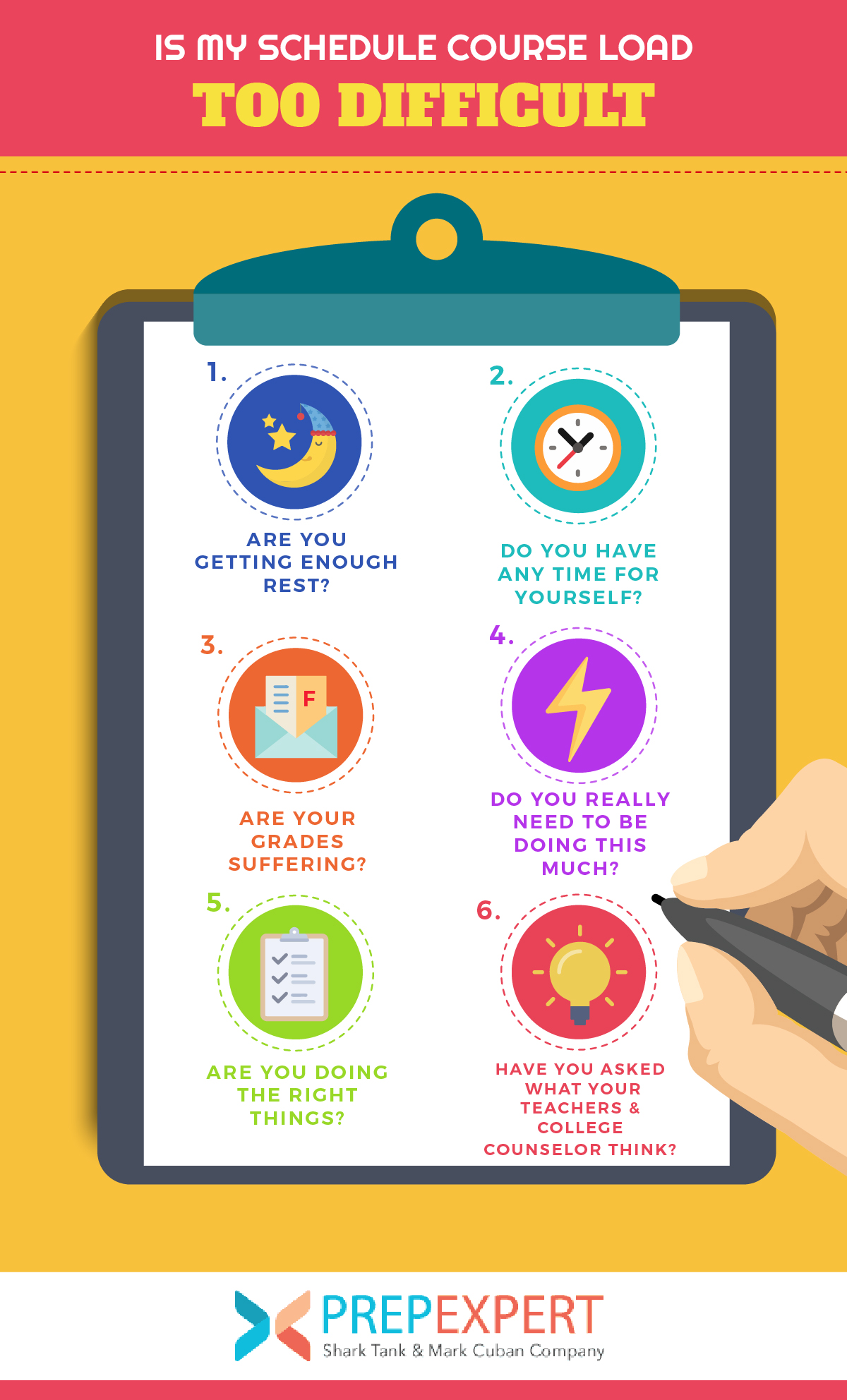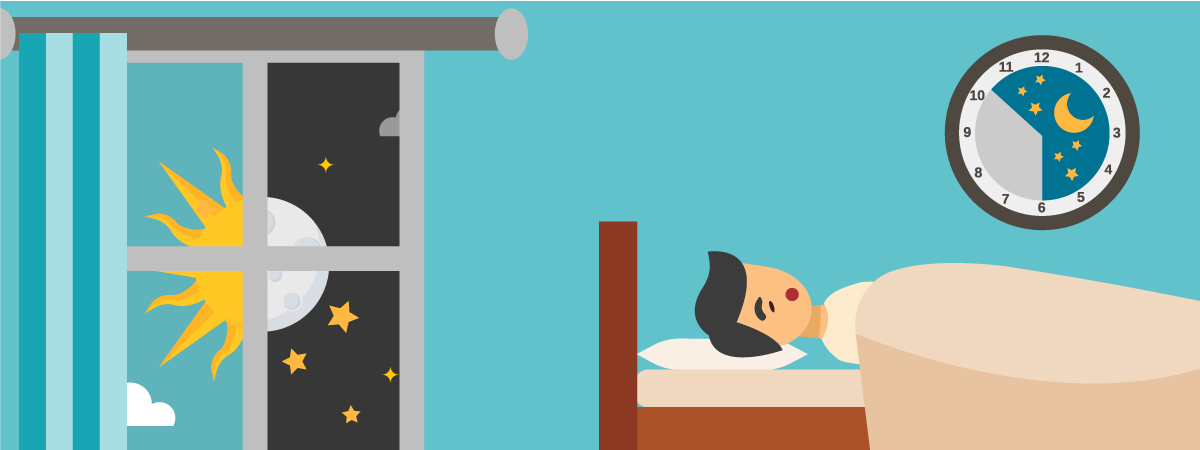Is My Schedule Course Load Too Difficult
High school students are some of the busiest and most stressed-out people out there. With a jam-packed schedule—classes, extracurricular activities, sports, standardized test prep, college applications, after-school jobs, et cetera—and countless worries on your mind, it is easy to lose perspective. If you’re feeling overwhelmed, you might want to ask yourself if your schedule and course load are too difficult.
Are your grades dropping, or is your performance slipping? Are you always tired, or do you never have the time to do the things you enjoy? If so, then consider reducing or lightening your course load so you have more time for yourself.
A few questions and suggestions to help you sort out this issue below. If you happen to be having difficulty with college entrance exams, consider taking an SAT prep course or ACT prep course with Prep Expert®.


Are You Getting Enough Rest?
If you’re not getting enough sleep, then consider reducing your workload.
You should be getting at least eight hours of sleep per night to perform at your best. In fact, numerous studies have shown that high school students need even more sleep than the average person does. If you’re not at least meeting this eight-hour threshold, you need to make some changes to your schedule in order to accommodate some more shut-eye.
Before you lessen your course load or obligations, ask yourself if you’re using your time efficiently. For example, perhaps you’d be better off studying on your own than with your after-school study group—you might be wasting a lot of time on idle chit-chat. Of course, it’s important to spend time with your friends—but you’re better off setting aside time for this, rather than trying to combine it with studying, and getting the most out of neither.
You should also consider how you’re getting to sleep. Avoid exercise and electronics—both of which throw off your body’s internal clock—in the hours before you go to bed. If you need something to help you wind down before you go to sleep, consider a cup of camomile tea and a good book instead.
[leadmagnet_five]
However, it could be that you simply have too much to do to be getting the amount of sleep you need. If this is the case, then get your priorities with your schoolwork, extracurricular activities, sports, and the rest straight. What do you need or want to be doing the most, and what can you put aside for another time?
Schoolwork has to come first. You probably won’t be able to reduce your course load by much, but perhaps you could drop down from AP Chemistry to a lower-level chemistry class, and use the time and stress you’ll have to focus on some of your other classes? Or, if you really want to take a course but simply don’t have the time in your schedule at the moment, maybe your school offers it over the summer?
You’ll likely have more leeway when it comes to other parts of your schedule. With extracurricular activities, focus on the one or two that you enjoy most, and forget about the others for now. Or, consider reducing your involvement—for example, instead of serving as class president and editing the school newspaper, stick with your class leadership position, and limit your involvement with the paper to submitting an article once in awhile.
With sports, ask yourself—how much is too much? Do you really need to play two fall sports? Perhaps you can try out for the football team this year and save cross-country for senior year when you’ll have a little more time in your schedule.

Do You Have Any Time For Yourself?
If you never have time to do the things you enjoy, make time for these things—it’ll improve your well-being and performance overall.
As mentioned, high school students are incredibly busy people. It’s likely that, on top of all your other obligations, you don’t have very much time for yourself. This doesn’t mean you shouldn’t have any time for yourself at all.
Whether it be hanging out with your friends or spending some time on your hobbies, carve out some time for enjoyment. A few hours a week is a good goal to set. When it comes to improving your mood, making time to catch a movie with your best friend, or taking a hike through a State Park with your dad, will go a long way.
The better your mood, the better you will do in your classes and other obligations. Just remember—if you don’t take care of yourself, you won’t be able to take care of anything else, either.

Are Your Grades Suffering?
If you’re working your hardest and your grades are still slipping, you need to reduce or lighten your course load.
It’s important to remember that you’re not Superman. If you’ve taken on a course load that’s too difficult for you, no matter how hard you work, you’ll still be worse off than if your schedule was more manageable and skill appropriate. Take a look at your schedule, analyze where you’re doing your best and where you’re struggling, and make changes accordingly.
For example, if you’re taking four AP courses—English Literature, US History, Chemistry, and Calculus AB—and getting As in the first three and a B- in Calculus, you should consider dropping down to a lower-level math class, or arranging to take AP Calc during another semester, when you’re less busy.
It’s true that colleges want to see that you’re challenging yourself, but they also want to know that you’re self-aware enough to not take too much on and adjust when necessary. Plus, even with the quality-point increase, an A in a non-AP course will still look better on your transcript than a B- in an AP course will.

Do You Really Need To Be Doing This Much?
Even if your ambitions are high, you might be doing more than you need to be to reach your goals.
Just because you’re hoping to gain admission to Harvard, Stanford, or another top-tier school, doesn’t mean you need to be working yourself to utter exhaustion. Remember that competitive colleges and universities want you to have a high GPA/class rank and standardized test scores, and a resume that shows you are well-rounded or gifted in a particular area.
What colleges and universities do not expect to see is an over-packed schedule that reflects poor time management and a lack of focus on your core interests. For example, Harvard will be duly impressed with your A in physics class, your science medal, and your participation in Science Club—you don’t need to add an auditing an advanced physics course at your local college on top of all this.
Remember—when it comes to the Ivy League and other top-tier schools, there are certain things that are essential for a successful application—a strong GPA and test scores, one or two extracurriculars, maybe a sport. Beyond this, ask yourself if the rest of what you’re doing is either necessary or gives you joy. If an obligation doesn’t fall under either of these categories, let it go.

Are You Doing The Right Things?
Make sure you’re doing what you need to be doing to reach your goals, rather than doing a lot of the wrong thing.
There’s nothing wrong with taking on a lot of obligations, so long as you can handle them and they’re helping you meet your goals. But before you take something on, be sure that it truly will help you achieve your goals, and isn’t simply more work in the wrong area.
For example, if you’re planning on applying to MIT to study mathematics, you probably want to devote more of your schedule to advanced science and math classes and related extracurriculars, rather than loading up on advanced English or foreign language classes. Or vice-versa, if you’re applying to study international relations at Georgetown.
[leadmagnet_two]
A well-rounded schedule is a good thing, and most high schools require students to take a certain number of core classes. Beyond this, though, use your time wisely. Choose electives that match your interests and aspirations, and find enough time to devote yourself to them.

Have You Asked What Your Teachers & College Counselor Think?
If you’re having trouble answering these questions on your own, talk with your teachers or with your guidance counselor—they can provide some much-needed perspective.
If you’re struggling in class, sit down with your teachers and ask them what they think about your schedule and obligations. Are there areas where you should be spending more or less time? You can ask your guidance counselor for help with this as well—with a particular eye on college admissions.
Having worked with hundreds of students in the past, your teachers and counselors will likely have a good sense of what’s too much and can be cut from your schedule. After all, you’re doing this high school thing for the first time—someone with a bit more experience under their belt might be exactly who you need to help get your priorities straight.
Best of luck with this, and remember that if it’s college entrance exams you need help with, Prep Expert® offers both SAT prep courses and ACT prep courses that have helped hundreds of students achieve their score goals.
For more test strategy, college admissions, and scholarship application tips sign up for our FREE class happening right now!
Written by Dr. Shaan Patel MD MBA
Prep Expert Founder & CEO
Shark Tank Winner, Perfect SAT Scorer, Dermatologist, & #1 Bestselling AuthorMore from Dr. Shaan Patel MD MBA

Finding the Best ACT Prep Resources
If you have a student preparing for the ACT, you have a lot of options for test prep. Some resources…

The ACT Syllabus: What’s On The Test and How To Ace It
The ACT is not a normal test. Let’s get that out of the way right now, because if you want…

How SAT & ACT Students Build Real Confidence Through Strategy, Support, and Structured Practice
Confidence is often talked about as a “nice-to-have” in test prep, but for many students, it becomes the dividing line…